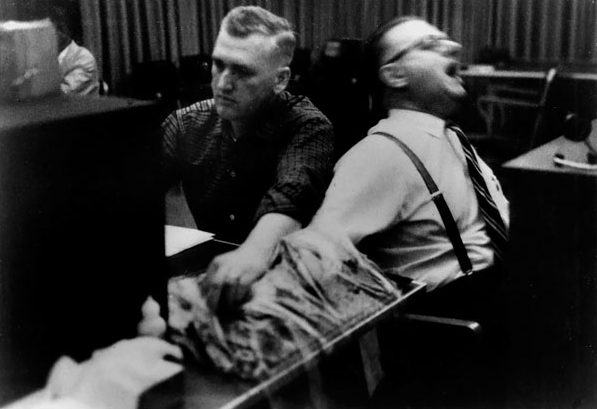Experiment: Most people swear they’d never hurt anybody for money, but many do just that
By Laura Sanders
6 April 2011 SAN FRANCISCO — When faced with a thorny moral dilemma, what people say they would do and what people actually do are two very different things, a new study finds. In a hypothetical scenario, most people said they would never subject another person to a painful electric shock, just to make a little bit of money. But for people given a real-world choice, the sparks flew. The results, presented April 4 at the annual meeting of the Cognitive Neuroscience Society, serve as a reminder that hypothetical scenarios don’t capture the complexities of real decisions. Morality studies in the lab almost always rely on asking participants to imagine how they’d behave in a certain situation, study coauthor Oriel FeldmanHall of Cambridge University said in her presentation. But these imagined situations are missing teeth: “Whatever you choose, it’s not going to happen,” she said. But in FeldmanHall’s study, things actually happened. “There are real shocks and real money on the table,” she said. Subjects lying in an MRI scanner were given a choice: Either administer a painful electric shock to a person in another room and make one British pound (a little over a dollar and a half), or spare the other person the shock and forgo the money. Shocks were priced in a graded manner, so that the subject would earn less money for a light shock, and earn the whole pound for a severe shock. This same choice was given 20 times, and the person in the brain scanner could see a video of either the shockee’s hand jerk or both the hand jerk and the face grimace. (Although these shocks were real, they were pre-recorded.) When researchers gave a separate group of people a purely hypothetical choice, about 64 percent said they wouldn’t ever deliver a shock — even a mild one — for money. Overall, people hypothetically judging what their actions would be netted only about four pounds on average. But when there was cold, hard money involved, the data changed. A lot. A whopping 96 percent of people in the scanner chose to administer shocks for cash. “Three times as much money was kept in the real task,” FeldmanHall said. When participants saw only the hand of the person jerk as it got shocked, they chose to walk away with an “astonishing” 15.77 pounds on average out of a possible 20-pound windfall. The number dipped when participants saw both the hand and the face of the person receiving the shock: in these cases, people made off with an average of 11.55 pounds. …
Shocking experiment shows talk is cheap
